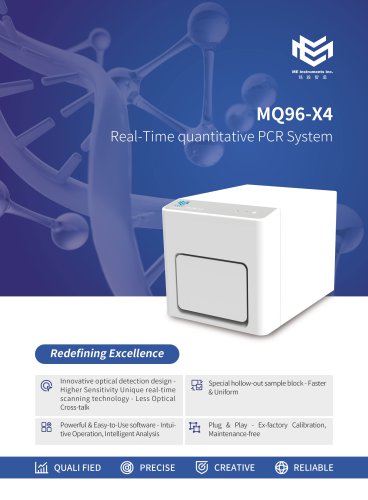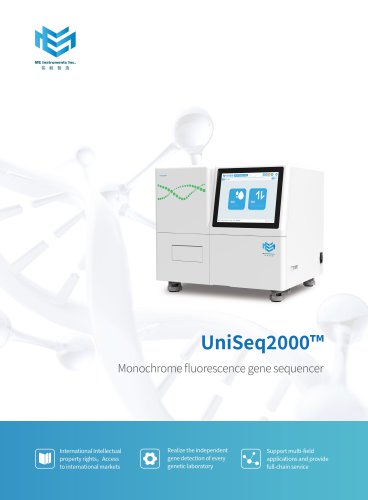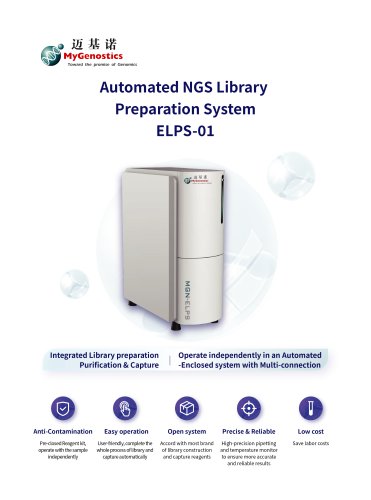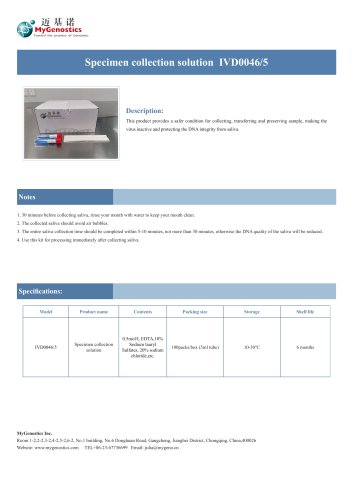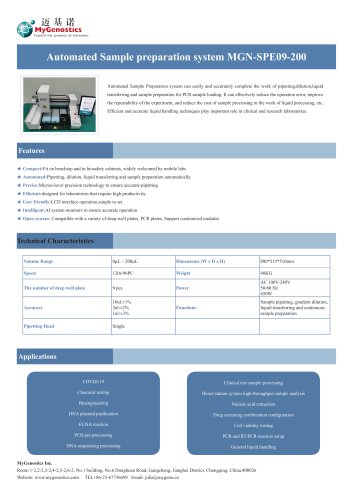
Catalog excerpts
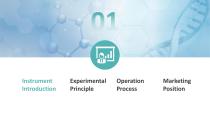
Instrument Introduction Experimental Principle Operation Process Marketing Position
Open the catalog to page 2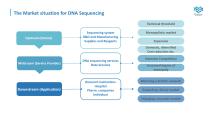
The Market situation for DNA Sequencing Technical threshold Upstream (Device) Sequencing system R&D and Manufacturing Supplies and Reagents Monopolistic market Expensive Domestic, diversified Cost reduction etc. Midstream (Service Provider) DNA sequencing services Data Services Downstream (Application) Research institutions Hospital Pharm. companies Individual Intensive Competition Increased degree of monopoly Maturing scientific research Expending clinical market Enlarging consumer market
Open the catalog to page 3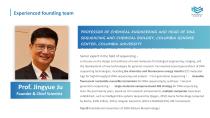
Experienced founding team PROFESSOR OF CHEMICAL ENGINEERING AND HEAD OF DNA SEQUENCING AND CHEMICAL BIOLOGY, COLUMBIA GENOME CENTER, COLUMBIA UNIVERSITY SAMUEL RUBEN-PETER G. VIELE PROFESSOR OF ENGINEERING Senior expert in the field of sequencing : Ju focuses on the design and synthesis of novel molecules for biological engineering, imaging, and the development of new technologies for genomic research. He invented several generations of DNA sequencing technologies, including the chemistry and fluorescence energy transfer (ET) molecular tags for high-throughput DNA sequencing and...
Open the catalog to page 4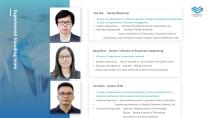
Experienced founding team • 18 years of experience in molecular genetic testing technology and application 12 years of experience in business management • Industry Experience : Chairman & Chief Scientist of MyGenostics Inc. • Education background : bachelor, Peking University Doctor, Department of Chemistry, Columbia University Post-Doctor, Cancer Research Center, Hopkins School of Medicine, USA Rong Zhou Doctor / Director of Enzymatic Engineering • 18 years of experience in enzymatic research • Industry Experience: Senior Scientist in novo nordisk China R&D center • Education background:...
Open the catalog to page 5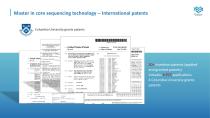
Master in core sequencing technology -- International patents Columbia University grants patents 20+ Invention patents (applied and granted patents) Includes 6 PCT applications 4 Columbia University grants patents
Open the catalog to page 6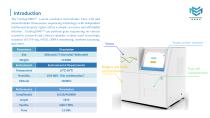
Introduction The UniSeq2000 TM system combines microfluidic Flow Cell and monochromatic fluorescence sequencing technologys with independent intellectual property rights, offers a simple, accuracy and affordable solution. UniSeq2000 TM can perform gene sequencing on various scientific research and clinical samples, widely used in multiple scenarios of CNV-seq, tNGS, cfDNA monitoring, newborn screening, and others. Parameters Environmental Requirements Touch screen monitor Reagent and Buffer Compartmens Flow cell
Open the catalog to page 7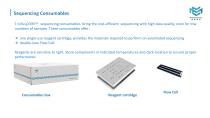
Sequencing Consumables UniSeq2000TM sequencing consumables bring the cost-efficient sequencing with high data quality, even for low numbers of samples. These consumables offer: ✬ one single-use reagent cartridge, provides the materials required to perform on automated sequencing ✬ double-lane Flow Cell. Reagents are sensitive to light. Store components in indicated temperatures and dark location to ensure proper performance. Reagent cartridge
Open the catalog to page 8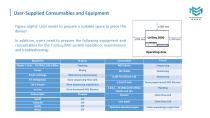
User-Supplied Consumables and Equipment Figure (right): User needs to prepare a suitable space to place the devicer. In addition, users need to prepare the following equipment and consumables for the UniSeq2000 system operation, maintenance and troubleshooting: Equipment Small centrifuge Store sequencing Flow Cells Store sequencing reagent box Store preprocessed NGS libraries Store denatured NGS libraries 2-20uL,20-200Ul,100-1000uL Pipette and tips Ethanol Clean Flow Cell Lens paper Clean Flow Cell Dust-free absorbent paper Clean sequencing reagent
Open the catalog to page 9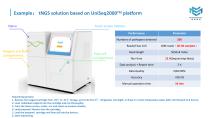
Example: tNGS solution based on UniSeq2000TM platform Status Touch screen monitor Performance Numbers of pathogens detected Read length Data analysis + Report time Data Quality Manual operation time Flow cell Compartment Reads/Flow Cell Reagent and Buffer Compartmens Sequencing process: 1. Remove the reagent cartridge from -25℃ to -15℃ storage, put it into the 4℃ refrigerator overnight, or thaw in a room temperature water bath until thawed (1-4 hours); 2. Load individual reagents into the cartridge and mix thoroughly; 3. From the Home screen, create run and select an analysis module, 4....
Open the catalog to page 10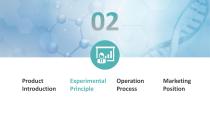
Product Introduction Experimental Principle Operation Process Marketing Position
Open the catalog to page 11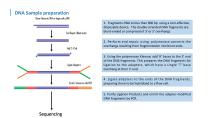
DNA Sample preparation 1. Fragments DNA to less than 800 bp using a cost-effective, disposable device. The double-stranded DNA fragments are blunt-ended or comprised of 3' or 5' overhangs 2. Perform end repair, using polymerase converts the overhangs resulting from fragmentation into blunt ends. 3. Using the polymerase Klenow, add ‘A’ bases to the 3' end of the DNA fragments. This prepares the DNA fragments for ligation to the adapters, which have a single ‘ T’ base overhang at their 3' end. 4. Ligate adapters to the ends of the DNA fragments, preparing them to be hybridized to a flow cell....
Open the catalog to page 12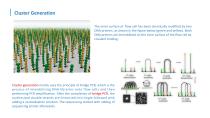
Cluster Generation The inner surface of flow cell has been chemically modified by two DNA primers, as shown in the figure below (green and yellow). Both DNA primers are immobilized on the inner surface of the flow cell by covalent binding. Cluster generation mainly uses the principle of bridge PCR, which is the process of immobilizing DNA libraries onto flow cells and then performing PCR amplification. After the completion of bridge PCR, the synthesized double strands are linearized into single followed with adding a neutralization solution. The sequencing started with adding of sequencing...
Open the catalog to page 13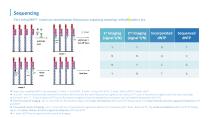
Sequencing The UniSeq2000TM system use monochromatic fluorescence sequencing technology with pH-sensitive dye. Incorporated dNTP Sequenced dNTP ✬Prepar four modified dNTPs ( for example): 3’-bolck -7-Cy5-dATP, 3’-bolck -5-Hcyc 647-dTTP, 3’-bolck -Biotin-dCTP, 3’-bolck -dGTP. ✬ Hcyc 647 is an environmentally sensitive fluorescent dye that emits the same fluorescence signal as Cy5 when pH <7, and no fluorescence signal under the same laser light source when pH > 7. 3’-bolck -Biotin-dCTP has no fluorescence signal and can be detected by intreaction with cy5 labeled Streptavidin (SA-CY5) ✬ The...
Open the catalog to page 14All MyGenostics Inc. catalogs and technical brochures
-
Specimen collection solution
2 Pages


